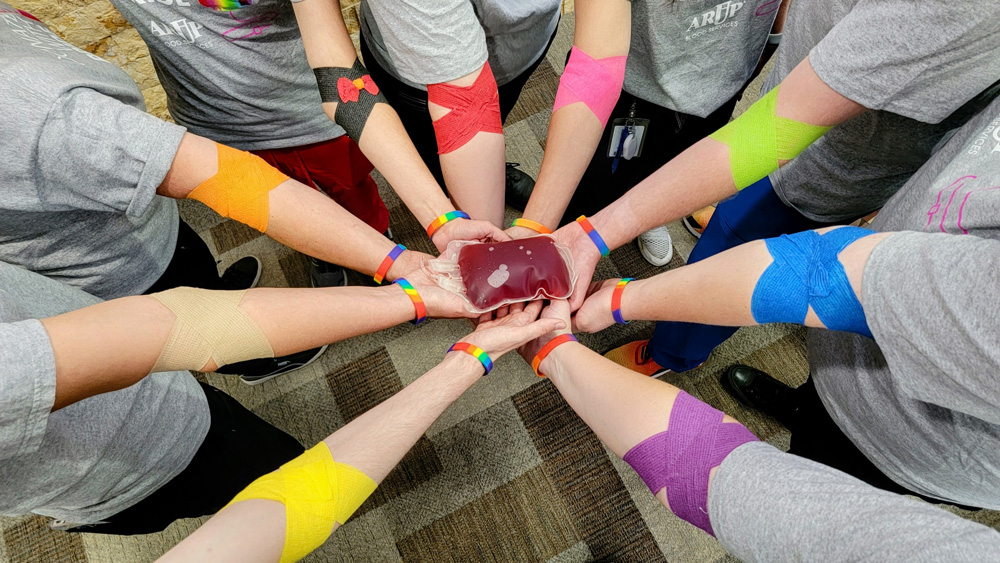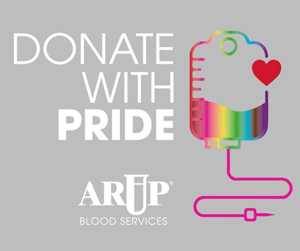
Donate With Pride—Starting July 18, 2023
On May 11, 2023, the U.S. Food and Drug Administration (FDA) issued final guidance regarding individual donor assessment for all blood donors. Every prospective donor will be asked the same series of questions, regardless of gender or sexual orientation.
 The FDA’s updated recommendations will expand the number of people eligible to donate blood but will keep safeguards in place that protect the blood supply. This may mean that individuals who were not eligible to donate are now eligible to donate; however, some individuals may remain ineligible to donate.
The FDA’s updated recommendations will expand the number of people eligible to donate blood but will keep safeguards in place that protect the blood supply. This may mean that individuals who were not eligible to donate are now eligible to donate; however, some individuals may remain ineligible to donate.
ARUP Blood Services applauds and supports the FDA for the new guidelines and looks forward to welcoming new donors to our two donor centers or to local blood drives around the greater Salt Lake area.
On July 18, 2023, ARUP Blood Services will accept donors who may have been previously deferred and new donors who align with the newly revised FDA guidance.
ARUP Blood Services is committed to achieving an inclusive blood donation process that treats all potential donors with equality and respect. Our blood collections team has updated our donor questionnaire in alignment with the new donor criteria to reflect the FDA changes.
Call 801-584-5272 with donor eligibility questions.
Policy and Process Information
All blood donors are required to meet FDA eligibility criteria to donate blood, every time. These eligibility criteria apply to all U.S. blood donor centers. The questions on the health history questionnaire are designed to ensure that the blood collection process is as safe as possible for the donors as well as for the recipients of blood.
During the predonation health history screening, ARUP Blood Services uses a questionnaire that was developed by the blood industry’s professional organization, the Association for the Advancement of Blood and Biotherapies (AABB), and approved by the FDA to assess an individual’s health history. Health history questions are based on past and current behavior risks (for example, travel, medication, sexual activity, etc.). Sexual activity questions are based on specific behaviors, not on sexual orientation. The words, “have sexual contact with” and “sex” are used in some of the questions, and apply to any sexual activities (vaginal, oral, or anal), regardless of whether a condom was used during the activity.
Previous FDA guidelines deferred gay and bisexual men who have had sex with another man during the past 3 months for 3 months.
With the new FDA guidance, donor centers will no longer ask sexual orientation-specific questions. Every donor will be asked:
“Have you had a new sexual partner/more than one partner in the past 3 months?”
- If “No,” no other questions will be asked about sexual activity.
- If “Yes,” you will be asked, “Have you had anal intercourse in the past 3 months?”
- If “Yes,” you will be deferred for 3 months from date of last occurrence.
ARUP Blood Services recognizes the hurt this policy may have caused to many in the LGBTQ+ community and believes blood donation eligibility should not be determined by methods that are based upon sexual orientation. We are committed to building relationships with partner organizations and want to work toward achieving this goal.
There is no deferral for a woman who has had sex with another woman, and the individual may be eligible to donate blood.
The revised FDA guidance states, “In the context of the donor history questionnaire, FDA recommends that male or female gender be taken to be self-identified and self-reported.” This change allows blood donors to register with the gender with which they identify. ARUP Blood Services no longer asks donors to answer questions for both males and females when attempting to donate. There is no deferral associated with being transgender.
ARUP Blood Services staff members are required to verbally confirm demographic information, including gender, with all presenting donors. This step helps ensure donor safety and accuracy of records. If ARUP Blood Services’ records have the incorrect gender, presenting donors may ask staff members to make the change upon registration. Individuals do not need to tell staff that they are transgender. ARUP Blood Services will use preferred names and pronouns.
The FDA revised guidance states, “In the context of the donor history questionnaire, FDA recommends that male or female gender be taken to be self-identified and self-reported.” The FDA requires ARUP Blood Services have donors select either male or female. Individuals do not need to tell staff that they are intersex.
ARUP Blood Services values all potential blood donors and understands that selecting either male or female may not align with how some individuals identify. ARUP Blood Services also knows that there is a difference between biological sex and gender. The revised FDA guidance states, “In the context of the donor history questionnaire, FDA recommends that male or female gender be taken to be self-identified and self-reported.” The FDA requires that ARUP Blood Services have donors select either male or female.
Individuals who do not have sex with another person may be eligible to donate blood.
FAQs
No. All donor centers in Utah, and across the country, will adopt the new FDA guidelines.
Your answers are always confidential. You will be asked to answer some questions on a tablet or from your home computer, and you will be asked some questions in person. The interview rooms at our donor centers are private. We create a private and quiet space at mobile blood drives.
Previous FDA guidelines deferred gay and bisexual men who have had sex with another man during the past 3 months for 3 months.
With the new FDA guidance, donor centers will no longer ask gbMSM-specific questions. Every donor will be asked:
“Have you had a new sexual partner/more than one partner in the past 3 months?”
- If “No,” no other questions will be asked about sexual activity.
- If “Yes,” you will be asked, “Have you had anal intercourse in the past 3 months?”
- If “Yes,” you will be deferred for 3 months from date of last occurrence.
Individuals who have been deferred in the past because of their gbMSM status may initiate donor reinstatement by contacting ARUP Blood Services at 801-584-5272. The deferral can be removed at the donor center.
Individuals can call ARUP Blood Services at 801-584-5272 or come to an ARUP location to donate. Donors will need to meet all other eligibility criteria.
If you have taken an oral drug to prevent an HIV infection (preexposure prophylaxis [PrEP] or postexposure prophylaxis [PEP]), you are asked to wait 3 months from the date of your last use of the drug to donate blood.
If you have taken an injection of PrEP, you are asked to wait 2 years from the date of your last use of the drug.
PrEP involves taking a specific combination of medicines as a prevention method for people who are HIV negative and may be at risk of HIV infection. PEP is a short-term treatment started as soon as possible after a high-risk exposure to HIV. The 3-month or 2-year waiting period is required due to these drugs interfering with viral replication and thus possibly altering the performance of diagnostic and screening tests for HIV, including extending the window period prior to detectable infection or a delay in producing antibodies.
If you have ever taken a drug to treat an HIV infection, known as antiretroviral therapy or ART, you are deferred from blood donation indefinitely because antiretroviral drugs do not fully eliminate the virus from the body, and donated blood can potentially still transmit HIV infection to a transfusion recipient. Although studies have documented that undetectable still equals untransmissible for sexual transmission, this does not apply to transfusion transmission.
Blood donation eligibility requirements are determined by the FDA. ARUP Blood Services, like all blood collectors in the U.S., is required to follow the FDA eligibility guidelines.
No. We are required to abide by FDA regulations.
There is no deferral associated with being transgender. You can answer the questions in the way that you identify. Every donor will be asked:
“Have you had a new sexual partner/more than one partner in the past 3 months?”
- If “No,” no other questions will be asked about sexual activity.
- If “Yes,” you will be asked, “Have you had anal intercourse in the past 3 months?”
- If “Yes,” you will be deferred for 3 months from date of last occurrence.
Yes. ARUP Blood Services tests each unit of donated blood for a number of infectious diseases. Although testing has improved, it is not 100% effective at detecting infectious diseases in donors with very early infection. The FDA selected the 3-month deferral to provide adequate time for donors who have new partners or who have had anal intercourse to be assessed for infection.
